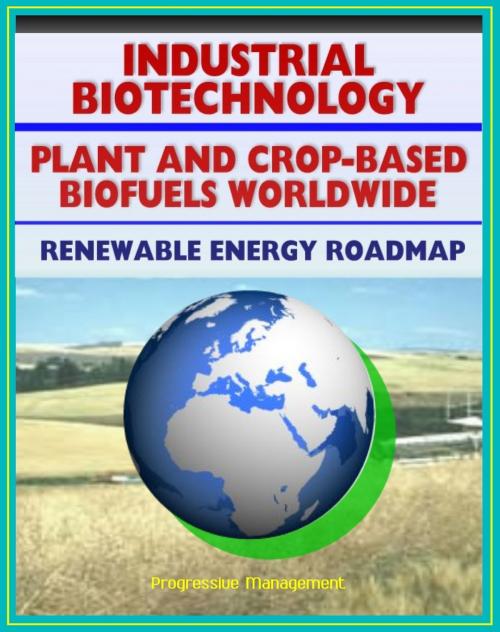Plant and Crop-based Biofuels and Industrial Biotechnology: Comprehensive World Survey of Biofuel Industries and Processes, Renewable Energy and Resources Roadmap
Nonfiction, Science & Nature, Science, Biological Sciences, Ecology| Author: | Progressive Management | ISBN: | 9781458161055 |
| Publisher: | Progressive Management | Publication: | March 3, 2011 |
| Imprint: | Smashwords Edition | Language: | English |
| Author: | Progressive Management |
| ISBN: | 9781458161055 |
| Publisher: | Progressive Management |
| Publication: | March 3, 2011 |
| Imprint: | Smashwords Edition |
| Language: | English |
Two federal documents, The Technology Roadmap for Plant and Crop-based Renewable Resources, and Industrial Biotechnology, Development and Adoption by the U.S. Chemical and Biofuel Industries, provide a unique and comprehensive status report on biofuel processes and industrial biotechnology around the globe, with information about exciting developments in China, Japan, Canada, Australia, Brazil, the European Union, India, and elsewhere - along with definitive data on American technology. The development and adoption of industrial biotechnology (IB) in the United States by the chemical and liquid fuel industries has expanded substantially. Contents include: Trends in Bio-based Business Activities, Liquid Biofuels, Bio-based Chemicals, Government Funding, Investment, Financial Performance, Factors Affecting the Development and Adoption of Industrial Biotechnology, Cost and Availability of Feedstocks, Cellulosic Ethanol, other technologies, R & D impediments, strategic alliances, domestic supply chain, foreign supply chain, intellectual property, patenting, trademarks, U.S. and Foreign government policies and programs, tax incentives, mandatory use regulations, loan guarantees, agricultural feedstock, tariff treatment for ethanol, domestic technology, research priorities for fulfilling a vision to enhance economic security through renewable plant and crop-based resource use, and much more. The technological success of the petrochemical industry is a tough act to follow. Industry and consumers have come to expect an unending stream of new and improved plastics and other materials to be provided in unlimited quantities. The fossil fuels from which the industry works, however, are finite - and often imported-so we need an additional source of durable, high performance materials. Renewable materials from home-grown crops, trees, and agricultural wastes can provide many of the same chemical building blocks-plus others that petrochemicals cannot. Despite the expertise and ingenuity of U.S. industry and tremendous productivity of U.S. agriculture and forestry, plant-based sources cannot automatically shoulder a major share of our chemical feedstock demand. Today, U.S. industry only makes minor portions of some classes of chemical products from plant-derived materials. Important scientific and commercial development breakthroughs are needed. Petrochemicals, agriculture, forestry, and other industries-as well as government-must make major coordinated efforts to most effectively increase the use of plant-derived chemicals. This document evaluates research, development, and other priorities for surmounting these technological challenges and sets out a technology roadmap for increasing the use of plant-derived materials for chemical building blocks. Currently, with the exception of lumber for wood products, trees for pulp and paper products, and cotton for garments, a very low volume of renewable resources is used to manufacture consumer goods. Key opportunities to increase the use of renewable resources can be grouped into four main areas: 1. Basic plant science - e.g., altering plant metabolic pathways to produce certain carbon molecules with valuable functional properties 2. Production - e.g., lowering unit production costs for consistent-quality raw materials 3. Processing - e.g., more economically separating diverse materials 4. Utilization - e.g., improving material performance through better understanding structure-function relationships for plant constituents.
Two federal documents, The Technology Roadmap for Plant and Crop-based Renewable Resources, and Industrial Biotechnology, Development and Adoption by the U.S. Chemical and Biofuel Industries, provide a unique and comprehensive status report on biofuel processes and industrial biotechnology around the globe, with information about exciting developments in China, Japan, Canada, Australia, Brazil, the European Union, India, and elsewhere - along with definitive data on American technology. The development and adoption of industrial biotechnology (IB) in the United States by the chemical and liquid fuel industries has expanded substantially. Contents include: Trends in Bio-based Business Activities, Liquid Biofuels, Bio-based Chemicals, Government Funding, Investment, Financial Performance, Factors Affecting the Development and Adoption of Industrial Biotechnology, Cost and Availability of Feedstocks, Cellulosic Ethanol, other technologies, R & D impediments, strategic alliances, domestic supply chain, foreign supply chain, intellectual property, patenting, trademarks, U.S. and Foreign government policies and programs, tax incentives, mandatory use regulations, loan guarantees, agricultural feedstock, tariff treatment for ethanol, domestic technology, research priorities for fulfilling a vision to enhance economic security through renewable plant and crop-based resource use, and much more. The technological success of the petrochemical industry is a tough act to follow. Industry and consumers have come to expect an unending stream of new and improved plastics and other materials to be provided in unlimited quantities. The fossil fuels from which the industry works, however, are finite - and often imported-so we need an additional source of durable, high performance materials. Renewable materials from home-grown crops, trees, and agricultural wastes can provide many of the same chemical building blocks-plus others that petrochemicals cannot. Despite the expertise and ingenuity of U.S. industry and tremendous productivity of U.S. agriculture and forestry, plant-based sources cannot automatically shoulder a major share of our chemical feedstock demand. Today, U.S. industry only makes minor portions of some classes of chemical products from plant-derived materials. Important scientific and commercial development breakthroughs are needed. Petrochemicals, agriculture, forestry, and other industries-as well as government-must make major coordinated efforts to most effectively increase the use of plant-derived chemicals. This document evaluates research, development, and other priorities for surmounting these technological challenges and sets out a technology roadmap for increasing the use of plant-derived materials for chemical building blocks. Currently, with the exception of lumber for wood products, trees for pulp and paper products, and cotton for garments, a very low volume of renewable resources is used to manufacture consumer goods. Key opportunities to increase the use of renewable resources can be grouped into four main areas: 1. Basic plant science - e.g., altering plant metabolic pathways to produce certain carbon molecules with valuable functional properties 2. Production - e.g., lowering unit production costs for consistent-quality raw materials 3. Processing - e.g., more economically separating diverse materials 4. Utilization - e.g., improving material performance through better understanding structure-function relationships for plant constituents.















